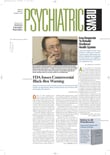Underrecognition of a range of mental health problems by clinicians, a lack of trust in the medical community, and poor access to mental health services are keeping many African Americans with mental illness from recovery.
William Lawson, M.D., Ph.D., who is chair of the psychiatry department at Howard University in Washington, D.C., illustrated these points at a seminar titled “African Americans: Facing Mental Illness, Experiencing Recovery,” which was held in conjunction with the 2004 annual conference of the National Alliance for the Mentally Ill.
Lawson appeared with a number of experts on African-American mental health issues, including Michelle Clark, M.D., who is chair of APA's Committee of Black Psychiatrists and an associate clinical professor of psychiatry at the University of California, San Francisco School of Medicine.
About 40 percent of African-American children are raised in poverty, and the median income of African Americans is just 60 percent of the median national income, Lawson pointed out. Mental health care is expensive enough that its cost is often seen as being prohibitive when people at the lower end of the income scale make spending choices, he said.
The fact that many African Americans don't receive needed mental health care is not just an issue of economics, however—a number of studies have shown that African Americans with the same level of health insurance as whites are less likely to receive care, he said.
Stigma is another barrier that afflicts would-be consumers in the African-African community, as well as those who can provide care in that community.
Lawson cited findings from a 1996 National Mental Health Association survey that found that 63 percent of African Americans believe that depression is a personal weakness, while only 31 percent believe it is a health problem.
Furthermore, only about 33 percent of African Americans surveyed said they would take medication for depression if their doctor prescribed it, compared with 69 percent of the general population.
Some African Americans view religion as a panacea for mental health problems. Almost two-thirds of African American respondents said they believe prayer and faith alone will successfully treat depression “almost all of the time” or “some of the time.”
When African Americans do come into contact with mental health clinicians, they are more likely to be diagnosed with schizophrenia than are whites showing the same symptoms, according to findings from a number of studies.
This may be due to a number of clinician-related factors, such as the failure to elicit all symptoms in African-American patients, failure to understand ethnic differences in symptom expression, or racial stereotyping.
“Providers tend to de-emphasize feelings and emphasize psychotic or unusual experiences in black people,” Lawson observed. In addition,“ protective wariness” on the part of African-American patients may be misinterpreted by clinicians as paranoia.
For African Americans, the ramifications of being overdiagnosed with schizophrenia mean that compared with patients of other ethnic groups, they have more but shorter hospitalizations, fewer privileges as inpatients, less occupational therapy, and less psychotherapy, and they are more likely to receive antipsychotic medication, Lawson noted.
In addition, he added, “African Americans are more likely to get older antipsychotic medications, which are associated with tardive dyskinesia.”
In contrast to patterns of diagnosing schizophrenia, African Americans are less likely than whites to be diagnosed with mood disorders such as depression, and “suicidal ideation often goes unrecognized,” Lawson said.
According to Clark, posttraumatic stress disorder (PTSD) is also a significant problem in the African-American community, yet it is not adequately identified or treated by clinicians.
“Individuals from disadvantaged life circumstances experience a high rate of stressors and may be at increased risk for PTSD,” Clark said.
Psychiatrists, primary care physicians, and other clinicians can improve their recognition of PTSD and other disorders in African Americans by taking steps to ensure that they are qualified to deliver culturally competent medical care, she noted.
Instead of waiting for African Americans to come to their offices, she encouraged clinicians and advocates to reach out to people in minority communities through screening and educational initiatives at barbershops, beauty salons, and other popular neighborhood spots. ▪
